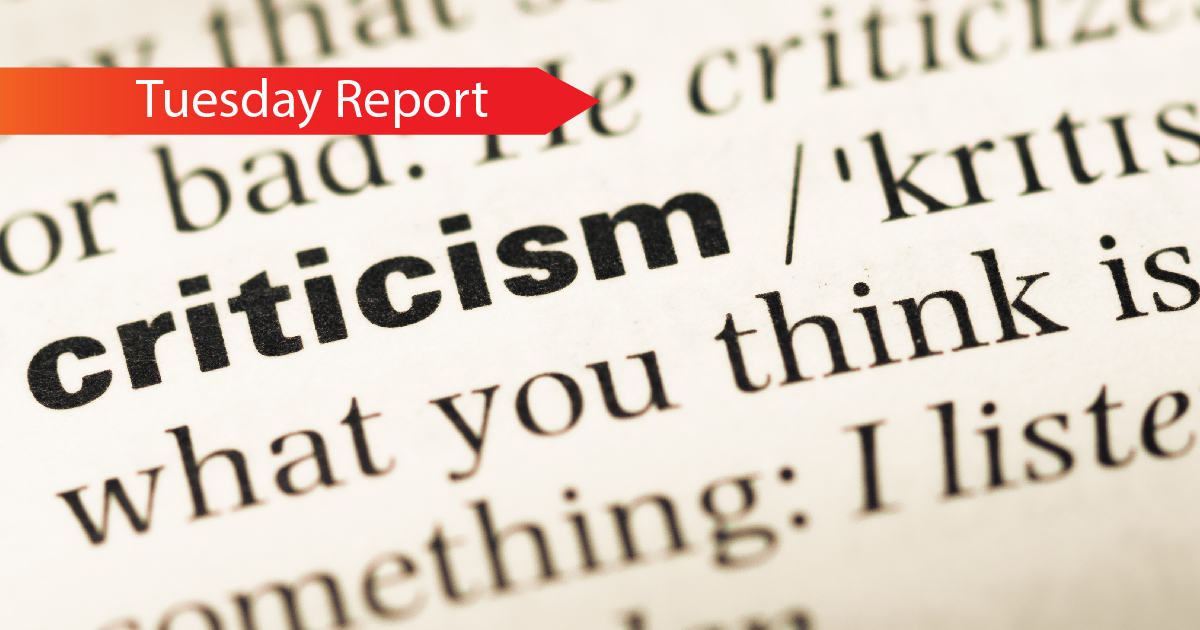A Guide to Handling Negative Feedback
How you accept and give criticism will determine a great deal about how you succeed—in both life and career. Learning from criticism is a key skill at work and at home; not becoming a punching bag for critics is equally important.
There are few more visceral fight or flight moments than when you’re criticized.
Being criticized sets up a whole set of chemical reactions in our bodies, our temperature rises, our heart beats faster. A wave of negative energy flows through our bodies.
How do you personally react to criticism? If you’re open, calm, and collected it’s likely you have taught yourself how not to overreact. It’s a great skill that doesn’t come naturally.
What’s Positive about Negative Feedback?
Avoiding criticism is a reaction not unlike when your hand gets too close to the fire, and you recoil. It is truly like the reaction to pain. Your brain considers that in being criticized, the very core of yourself is being threatened. Reacting to criticism is a protective function of the brain. It is the brain’s reactive system to protect who you are.
Yet the disastrous accounts of managers and organizations who ignored negative feedback— only to lead their organizations over the cliff—are too numerous to even name. Hearing negative feedback—criticism—is the only way people and organizations can make mid-course corrections that allow them to continue. Like a speeding automobile, criticism is the moderating factor that keeps us on the road.
Here’s What’s True about Criticism in Organizations:
- You’re Never a Hero When You Criticize—Use Criticism Only When Your Have to. Criticism is like dynamite—it can blast a tunnel through a mountain to the other side—or it can blow up a good part of a city. If you get a negative reaction to negative feedback, drop it. They are not ready to hear what you have to tell them.
- Not Every Criticism is Well-intentioned—Don’t Become a Punching Bag. People criticize for many reasons. Sometimes they’re dead right about a weakness you have that you need to change. At other times they’re establishing their own superiority and their place above you in the pack. Listen openly..and with caution.
- Sometimes You Are Right—Even in the Face of Overwhelming Criticism. When that happens, you find yourself in the minority view, and sometimes standing alone, and no matter the criticism, you have to stand your ground.
- Almost Every Criticism Has Some Merit—We Should Listen and Learn. There is almost always benefit from any criticism—no matter from whom or for what reason. The right corrective criticism with the right response can catapult your career forward.
A Check List for Handling Criticism
- Create an Appetite for Criticism. The basic reason we fear criticism is a fundamental lack of confidence in ourselves. As I gain confidence in myself and my abilities, I’ll be less sensitive to criticism. I’ll have confidence in my ability and I’ll value criticism as a way to improve.
- When You’re Criticized, Get a Third Party Opinion. Is it true I was a jerk at the meeting? Did my presentation suck as bad as some people thought? Ask people you trust, people you don’t trust, people you like, and those you don’t. Get their feedback, but don’t be ruled by the crowd. You are CEO of who you are–make your own final decision.
- Use a 360-Degree Feedback System. The right type of criticism/feedback can be an organization’s competitive edge. What are the real factors that block our organization’s ability to deliver products and services today? How are we doing as an organization? What will keep us from scaling? With a 360-degree feedback system, you ask the right questions and get the right answers–the absolute key to organizational success or failure.
- Develop a communication Feedback Pipeline—that Flows Both Ways. If you believe that you have a communication system, with newsletters, emails, and all hands meetings, you have a one-way pipeline–from management to employees. An organization cannot be successful unless it is getting feedback from the people who are making it happen. “Management By Walking Around” and getting employee opinions worked 30 years ago, but a modern real-time two-way communication pipeline is necessary for today. It needs to leverage technology and in-person communication when possible.
If we are honest, even in the best of organizations, people feel that if they criticize, their careers and jobs could be in jeopardy. Management often puts a gag order on criticism. Yet the information that people aren’t giving us could very well ruin us. Open and honest feedback is not just nice—it’s survival. If you would like to find landmines in your organization and keep them from blowing the place up, feedback is our business.






